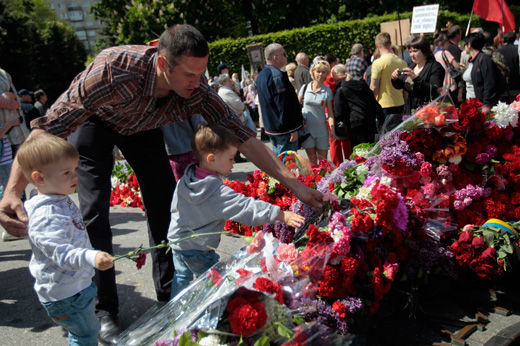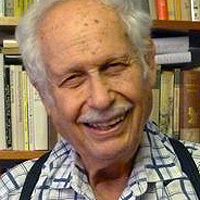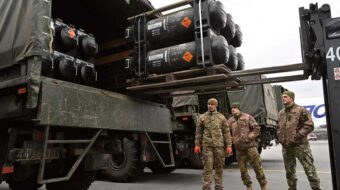
BERLIN – Germany is having difficulty with its Ukraine policy. Running up a down escalator is difficult enough but trying to keep your footing both on the up and on the down escalator at the same time is simply impossible. Yet that’s what Germany is attempting with its current Ukraine policy.
Between 1989 and 1994 (after Soviet soldiers left the German Democratic Republic — East Germany) the newly-unified country swiftly forgot all promises to the contrary and joined in expanding the more economic European Union and the more military NATO. The EU and NATO went on to include Poland, Slovakia, Estonia, Lithuania, Latvia, to Bulgaria, Rumania and, not yet quite fully, to Azerbaijan and Georgia.
A glance at a map makes it all too clear: adding the wide Ukrainian expanse would mean almost total western encirclement of Russia’s main territory, further diminishing its access to the Black Sea and the Mediterranean and moving alarmingly close to its heart.
At first Berlin joined in happily with Washington. But Ukraine’s Maidan Square hero, the tall, tough German-backed boxing champion Vitali Klitchko, was pushed out of the ring. The famous hacked telephone call of the State Department’s Victoria Nuland with the US ambassador, at ringside in Kiev for the Kagan-Clinton-Kerry “betting syndicate”, made it clear that the U.S. man Yatsenyuk was fixed in advance to win the champion’s belt as new premier. And the entries from the European Union? “Fuck the EU … ‘Yats’ is the man”, Nuland declared primly. When the foreign ministers of Germany, Poland and France tried to referee the bout, and cool it, they landed on the ropes. Cooling was out, “Yats” was in – and still is today.
Now Chancellor Merkel and her Social Democratic foreign minister Steinmeier are caught on those contrary moving escalators. They can no more buck the stronger players in Kiev from across the Atlantic than they can keep Obama’s inquisitive experts from tapping telephone talk by Angela and her team. But Berlin’s Spree River and the Rhine are far closer to the Moskva than the Potomac, geographically and economically; many weighty German corporations feel protective about Russian oil and gas pipelines or export and investment opportunities, and keep pushing for moderation. Which way to go?
This split helps explain why Ursula von der Leyen, German Defense Minister, talks tough and sends the military to Russian borders while Foreign Minister Steinmeier keeps on with building bridges and round tables, hopefully with success, while Merkel urges the European Union to step up pressure against Russia with sanctions and visa denials but then cautions against any military actions.
Most media are less cautious. They were always careful never to criticize one word or action of men like Sharon, Netanyahu or Avigdor Lieberman in Israel – because of Germany’s horrendous past (and/or a desire for recognition and respectability). Yet the same media rarely if ever recall that Nazi Germany killed 25 million or more Soviet people, in the majority women, children or starved POWs. It appears at times as if such media never really “forgave” the Russians for horrors like the Nazi siege of Leningrad.
But Putin will not have forgotten them or the immense destruction as he observed the growing NATO encirclement of Russia. Nor will he have missed stray, unofficial hints that some view Maidan Square as a dress rehearsal for a grand-scale repeat performance on Red Square. Yet somehow it is Putin who is unceasingly accused of aggressive ambitions!
Aside from the balancing acts, neither Merkel, Steinmeier nor the media majority seem to note – or care – that the Kiev junta includes members of the Svoboda party, leaders in the Maidan uprising, with a menacing fascist past. Its boss, Oleh Tyahnybok, says it stands for “Christian values” and the “rejection of various deviations”. While it has discreetly superseded its early hero, Hitler deputy Josef Goebbels, with Stepan Bandera, who joined the Nazis in 1941 in killing Russians, Jews and Poles, Svoboda not only wants bans on most abortions and homosexuals (its only agreement with Putin) but wants to make Ukrainian the only legitimate language, pushing out the Russian spoken in the eastern Ukraine.
Svoboda party’s ally, a band of extremists called the Right Sector, is evidently being built up as a sort of National Guard, uniformed, more disciplined, but as violent as ever in its killing sprees – from the flaming building in Odessa to tank and parachute raids into the Eastern Ukraine. Both groups conceal only thinly their anti-Semitism and seem to have had ties to neo-Nazis in other countries, yet western leaders remain oh-so-generous in sending money, arms and propaganda to what a retired top German Social Democrat called the “only government in Europe which includes open fascists”. Especially disappointing perhaps: the Green Party in Germany is the most belligerent of all, rejecting any criticism of Kiev and all but demanding provocative action against Russia.
One major party in Germany refuses to join the dangerous game: the LINKE – or Left Party. The Ukraine crisis was high on the agenda of its congress in Berlin May 9th-11th. Opinions did differ; Gregor Gysi, its best-known leader, chair of the party’s caucus in the Bundestag, criticized Putin on the Crimea annexation. Others supported him. But the entire congress gave major blame for the crisis to NATO, the European Union and the German government. It opposed both sanctions against Russia and financial assistance for Kiev.
The almost equally well-known LINKE leader Sahra Wagenknecht charged: “A coup-d’état government with neo-fascist and anti-Semitic members has been installed with the blessing of Merkel and Steinmeier”. Even those critical of Putin called for more respect for Russia; Berlin chairman Klaus Lederer said: “We must never forget the immeasurable losses of the people of the Soviet Union during the invasion by Nazi Germany nor the sacrifices they made in freeing Europe from fascism.” Above all, the congress demanded negotiations and a rejection of any military escalation. Its Ukraine resolution, with some compromises, was passed almost unanimously by the congress.
Photo: In Kiev, Ukraine, people put flowers to the monument to WWII victims of the Nazis, at a Victory Day celebration that commemorates the 1945 defeat of Nazi Germany, May 9. (AP Photo/Sergei Chuzavkov)
Meet Victor Grossman In New York City at the People’s World table at the Left Forum, May 30 – June 1. Grossman will be autographing copies of his book, “Crossing the River: A Memoir of the American Left, the Cold War, and Life in East Germany.”












Comments